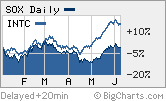 |
| Chip chip hooray! Semiconductor stocks have surged during the past month and a half and Intel has led the rally. |
|
|
|
|
|
|
|
| More about chips and other hardware stocks
|
|
|
|
|
NEW YORK (CNN/Money) -
Intel, the world's largest maker of semiconductors, raised its sales forecast for the second quarter Thursday, citing strong demand for chips used in laptop computers.
The Santa Clara, Calif.-based company said it now expects sales of $9.1 billion to $9.3 billion for the quarter. The $9.2 billion midpoint is higher than the $8.97 billion consensus sales estimate of Wall Street analysts, according to Thomson/First Call. Intel reported revenue of $8.05 billion in the second quarter of 2004.
The company also said that gross margins, an important measure of profitability in the semiconductor industry, should be about 57 percent in the quarter, up from its earlier forecast of 56 percent.
Analysts have attributed the success of Intel's Centrino chipset, used in wireless notebook computers, as a main reason for the improving margins, since these chips are more profitable than those used in desktops.
Shares of Intel (Research), a Dow component, gained 2.2 percent in regular trading on the Nasdaq Thursday but dipped more than 1 percent after-hours, according to INET. The stock has surged more than 18 percent since the beginning of May thanks to increased investor optimism about technology demand.
In addition, Apple (Research) announced Monday that it would start using Intel chips in its Macintosh line of computers next year and that by the end of 2007 all of its new computers would run on Intel processors. Analysts have called this a positive development for Intel as it further cements the firm's dominant position in the PC market.
A pause after a big run?
The decline in Intel's stock following its mid-quarter update Thursday might be a "sell on the news" reaction from traders who had increasingly high hopes for the company. After all, Intel's bullish outlook is the latest in a series of good news for the chip sector.
On Tuesday, Texas Instruments (Research), the leading maker of digital signal processors used in cell phones, boosted its sales and earnings targets for the second quarter.
Taiwan Semiconductor (Research), which manufactures chips for other semiconductor companies, said Thursday morning that shipments during the second quarter should be higher than originally expected. And analog chip maker National Semiconductor (Research) reported better-than-expected sales and profits for its fiscal fourth quarter Thursday afternoon.
The Philadelphia Semiconductor Index, which tracks 19 of the largest chip and semiconductor equipment firms, is up nearly 14 percent since the beginning of May.
As such, the after-hours sell-off could merely be a temporary pullback after a strong run for Intel and the rest of the sector.
"Given the runup and the high expectations you should see some selling," said Apjit Walia, an analyst with RBC Capital Markets.
Street still feels chipper about Intel
But Walia thinks that investors will soon realize that fundamentals look strong for the rest of the year and that third-quarter sales figures will need to be revised higher as well.
To that end, Walia said he recently raised his third-quarter sales target to $10.05 billion, above the Street's consensus estimate of $9.47 billion.
Michael McConnell, an analyst with Pacific Crest Securities, added that even though the company only specifically mentioned the robust sales of laptop computers in its update, that is not the only reason why Intel was able to lift its sales forecast. He said that strength in emerging markets is helping as well.
"There's more to Intel than notebooks. China and India are seeing stronger-than-normal demand for desktops," McConnell said.
During a conference call with analysts, Intel chief financial officer Andy Bryant said that there was good demand across all geographies. He added that the company was not building inventory too aggressively to meet demand. Shares of Intel and other chip companies suffered last year due to fears about rising inventories.
So even if Intel's stock does take a short-term hit, there is reason to be excited about the long-term.
"The company is well positioned for the future," said Jim Huguet, president of Great Companies, a Clearwater, Fla-based money management firm that owns Intel in its TA IDEX Great Companies Technology fund.
Huguet added that he's particularly optimistic about Intel's prospects going forward now that Paul Otellini is chief executive officer.
Otellini, previously Intel's chief operating officer, is the first non-engineer in the company's history to become CEO. But Huguet said that Otellini, who worked his way up through Intel's sales side, should help Intel focus even more on marketing.
For more about Apple's switch to Intel, click here.
For a look at more semiconductor stocks, click here.
Analysts quoted in this story do not personally own shares of Intel and their firms do not have an investment banking relationship with the company.

|